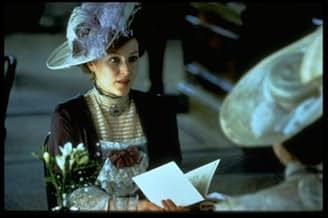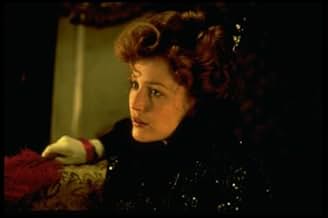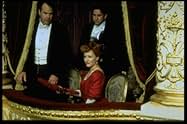IMDb रेटिंग
7.0/10
8.2 हज़ार
आपकी रेटिंग
अपनी भाषा में प्लॉट जोड़ेंA woman risks losing her chance of happiness with the only man she has ever loved.A woman risks losing her chance of happiness with the only man she has ever loved.A woman risks losing her chance of happiness with the only man she has ever loved.
- 2 BAFTA अवार्ड के लिए नामांकित
- 6 जीत और कुल 29 नामांकन
Anthony LaPaglia
- Sim Rosedale
- (as Anthony Lapaglia)
Mary MacLeod
- Mrs. Haffen
- (as Mary Macleod)
कहानी
क्या आपको पता है
- ट्रिवियाEdith Wharton named the source novel after a passage from Ecclesiastes 7:4, "The heart of the wise is in the house of mourning; but the heart of fools is in the house of mirth."
- गूफ़The film, which takes place during 1905-07, depicts several characters attending a performance of the opera "Cosi fan tutte" -- but that opera was first performed in New York in 1922.
- क्रेज़ी क्रेडिटThanks to the staff of Kelvingrove Museum, the Lord Provost and staff at Glasgow City Chambers, residents of Kersland Street, all the staff at the Arthouse Hotel, Glasgow, and the Earls of Wemyss and March and Lady Wemyss.
- साउंडट्रैकOboe Concerto in D Minor: Slow Movement
Composed by Alessandro Marcello
Performed by Ferenc Erkel Chamber Orchestra
Courtesy of Naxos Recordings
फीचर्ड रिव्यू
Director Terence Davies has done a magnificent job of recreating the turn of the century in "The House of Mirth," a 2000 film starring Gillian Anderson, Eric Stoltz, Dan Ackroyd, Laura Linney, Anthony LaPaglia, and Terry Kinney.
Anderson is Lily Bart, a beautiful young woman of good social standing, traveling in the best circles, who throws away her opportunities for a good marriage because she wants something more meaningful. However, her reputation begins to suffer due to her circle's misreading of an innocent situation, and things go from bad to worse for her as she descends down the social strata. She has it in her power to win back everything she has lost but refuses to stoop that low due to her love for one man.
It's obvious that Davies took a great deal of care with this film. It is not infused with modern sensibilities, the period look is authentic, as is the look of the cast. By that I mean, Gillian Anderson's sumptuous red hair, full beautiful face, and lovely figure are much more period than, say, Gwyneth Paltrow's -- and yet films are rarely cast with an eye toward capturing the period in that way. The casting of Dan Ackroyd as Trenor is unusual but very right - he's not truly of the class he travels in and a real glad-hander. Eric Stoltz is Selden - handsome without being drop dead gorgeous, gentile without being effeminate, who has good chemistry with Anderson.
The villainess of the piece is Laura Linney as the awful Bertha Dorset, a cunning witch, and as usual, Linney is perfection -- smiling, subtle, and you can just see the knife going in. In the book she is more responsible for Lily's troubles than in the film. In the film, we see her making initial trouble for Lily; in the book, she continues to work on destroying her with a whisper here and word there.
What makes the story of Lily so frustrating is that she can ruin Bertha in five minutes but refuses, suffering instead, which drove me crazy. That's not the film's fault.
This was an era where no one expressed emotions, so when someone says, thank you or I understand, there is a world of meaning to be read in the eyes. It's a world of artifice, and Davies obviously worked at getting this from his actors. Everything is in what lies beneath.
The acting is uniformly excellent; only Gillian Anderson falls a little short of the mark. Lily is an extremely difficult role, and Anderson at least in 2000 did not have all the necessary skill to completely pull it off. She has the look, the bearing, and the intelligence. What she lacks is the ability to actually become someone of that era, rather than putting it on like an overcoat. She does much better in the latter part of the film, which calls for a different set of acting muscles than in the beginning.
Reminiscent a bit of "Sister Carrie," "The House of Mirth" points up the difficulties of women in that time period to make their way, of the boundaries of class, and the rigidity of the upper class. Highly recommended, but not an easy, cheerful film by any means.
Anderson is Lily Bart, a beautiful young woman of good social standing, traveling in the best circles, who throws away her opportunities for a good marriage because she wants something more meaningful. However, her reputation begins to suffer due to her circle's misreading of an innocent situation, and things go from bad to worse for her as she descends down the social strata. She has it in her power to win back everything she has lost but refuses to stoop that low due to her love for one man.
It's obvious that Davies took a great deal of care with this film. It is not infused with modern sensibilities, the period look is authentic, as is the look of the cast. By that I mean, Gillian Anderson's sumptuous red hair, full beautiful face, and lovely figure are much more period than, say, Gwyneth Paltrow's -- and yet films are rarely cast with an eye toward capturing the period in that way. The casting of Dan Ackroyd as Trenor is unusual but very right - he's not truly of the class he travels in and a real glad-hander. Eric Stoltz is Selden - handsome without being drop dead gorgeous, gentile without being effeminate, who has good chemistry with Anderson.
The villainess of the piece is Laura Linney as the awful Bertha Dorset, a cunning witch, and as usual, Linney is perfection -- smiling, subtle, and you can just see the knife going in. In the book she is more responsible for Lily's troubles than in the film. In the film, we see her making initial trouble for Lily; in the book, she continues to work on destroying her with a whisper here and word there.
What makes the story of Lily so frustrating is that she can ruin Bertha in five minutes but refuses, suffering instead, which drove me crazy. That's not the film's fault.
This was an era where no one expressed emotions, so when someone says, thank you or I understand, there is a world of meaning to be read in the eyes. It's a world of artifice, and Davies obviously worked at getting this from his actors. Everything is in what lies beneath.
The acting is uniformly excellent; only Gillian Anderson falls a little short of the mark. Lily is an extremely difficult role, and Anderson at least in 2000 did not have all the necessary skill to completely pull it off. She has the look, the bearing, and the intelligence. What she lacks is the ability to actually become someone of that era, rather than putting it on like an overcoat. She does much better in the latter part of the film, which calls for a different set of acting muscles than in the beginning.
Reminiscent a bit of "Sister Carrie," "The House of Mirth" points up the difficulties of women in that time period to make their way, of the boundaries of class, and the rigidity of the upper class. Highly recommended, but not an easy, cheerful film by any means.
टॉप पसंद
रेटिंग देने के लिए साइन-इन करें और वैयक्तिकृत सुझावों के लिए वॉचलिस्ट करें
- How long is The House of Mirth?Alexa द्वारा संचालित
विवरण
बॉक्स ऑफ़िस
- बजट
- $1,00,00,000(अनुमानित)
- US और कनाडा में सकल
- $30,43,284
- US और कनाडा में पहले सप्ताह में कुल कमाई
- $48,770
- 25 दिस॰ 2000
- दुनिया भर में सकल
- $51,64,404
- चलने की अवधि2 घंटे 15 मिनट
- रंग
- ध्वनि मिश्रण
- पक्ष अनुपात
- 2.35 : 1
इस पेज में योगदान दें
किसी बदलाव का सुझाव दें या अनुपलब्ध कॉन्टेंट जोड़ें
























